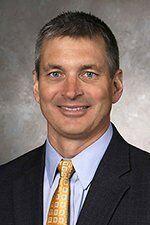Julie Lattimer had had a pretty good experience with Bright Health for most of the time she had a health insurance policy with the company, so she was surprised when a routine $60 lab charge was denied back in August.
The Lincoln woman said she was even more surprised by what the lab told her: Bright Health apparently wasn’t paying the claim because it had run out of money.

Julie Lattimer
The Minneapolis-based insurer, which started offering policies in Nebraska via the Affordable Care Act Marketplace in 2020, announced earlier this year it would cease offering policies in most states, including Nebraska, next year.
The move was largely due to financial woes at the startup company, which reported a $1.2 billion loss in 2021.
It’s not clear if other Nebraskans insured by Bright Health have had an experience similar to Lattimer’s. The Nebraska Department of Insurance said it could not comment on Bright Health’s financial condition and whether it had received any complaints about the company.
People are also reading…
But the company has had issues in other states. In April, Colorado fined Bright Health $1 million after receiving numerous complaints from residents about the insurer not paying claims in a timely fashion.
In addition, there have been nearly 200 complaints to the Better Business Bureau about Bright Health over the past three years, the majority of them relating to claims not being paid or payments not received in a timely manner.
Lattimer said she’s spoken with a representative from the company who now says her claim will be paid, but it will take 30-60 days, meaning it will wind up taking four to five months to pay what she called “a little tiny claim.”
Bright Health did not respond to a request for comment.
While Bright Health may be an anomaly in terms of the extent of its payment issues, hospitals and other health providers say they are encountering more problems in getting payments from the health insurance companies they work with.
“As a whole, the insurance industry has been slowing down payments,” said Mike DeWerff, Bryan Health’s chief financial officer.

Mike DeWerff
DeWerff said he’s recently seen an uptick in the amount of time it takes for commercial insurers to pay a claim Bryan submits, something that in the past averaged about 50 days.
“I’d say we’re up a little bit, maybe five days, so maybe 10%,” he said.
DeWerff also said the Lincoln-based hospital system is seeing more claim denials.
In 2019, before the coronavirus pandemic, Bryan averaged receiving about 800 insurance claim denials per quarter, he said. That increased to about 1,000 denials per quarter over the past couple of years and about 1,200 per quarter in the second half of this year.
“The denials are way up in the last year,” DeWerff said.
The most recent data from the National Association of Insurance Commissioners showed a slight uptick in denials last year, reaching 15% compared with 14.5% in 2020. However, that was still lower than in 2018 and 2019, when denial rates were 16.9% and 15.3%, respectively.
But a study from consulting firm Kaufman Hall shows that denials likely have increased this year. The study reported that two-thirds of hospitals reported an increased rate of claims denials in 2022.
Bryan in not the only health care organization to report problems with health insurers.
Janna Cline, chief financial officer of Faith Regional Medical Center in Norfolk, said she’s encountering more issues with insurance companies and has seen the hospital’s relationship with some of those companies deteriorate.

Janna Cline
“Insurers are really trying to reduce what they pay us,” Cline said during a Zoom meeting last month with the Nebraska Hospital Association. She also noted that it’s taking longer than it has previously to get paid.
“We’ve had some claims here internally that (are) 18 months old that we are having trouble getting insurers to pay us for,” she said.
It’s not just payment delays and claims denials that are dogging hospitals.
“We’re seeing more requirements for prior authorizations,” said Jeremy Nordquist, president of the Nebraska Hospital Association.

Jeremy Nordquist
When hospitals run into those roadblocks, whether it’s prior authorization, a slow payer or an outright denial, they have to spend a lot of time and effort submitting appeals or trying to get their money.
For DeWerff, that’s the biggest issue.
He said a health system the size of Bryan doesn’t feel that big of a financial sting by being paid a few days later.
What does cause a financial burden is the amount of staff Bryan has to have just to deal with insurers.
DeWerff said the company pays $2.5 million a year in salaries to 45 people who do nothing but work on preapprovals for care.
“Our biggest frustration is what we have to spend on the administrative burden,” he said.
Ivan Mitchell, CEO of Great Plains Health in North Platte, agreed, saying insurers’ tactics are leading to “a bureaucratic mess in making it more difficult to get paid.”

Ivan Mitchell
He decried what he said are “a lot of bad players in health care right now,” singling out private companies participating in the government’s Medicare and Medicaid programs.
For example, Mitchell said the three managed Medicaid companies Great Plains works with “all find different ways to deny claims.”
He also called Medicare Advantage, which is a system where private companies bundle people’s Medicare benefits into a package and add certain perks, “Medicare Disadvantage,” and said those companies also look for ways to deny claims and not provide the services they promise.
The state Department of Insurance lumps all complaints against insurance companies together, so it’s difficult to know if there have been more complaints about health insurers, but it’s possible, since overall insurance complaints are up.
As of Wednesday, the department reported 498 complaints so far this year, which is more than in either 2020 or 2021, although it’s well below pre-pandemic numbers.
America’s Health Insurance Plans, a trade group that represents health insurance companies, did not respond to a request to comment for this story. But in a May letter to the Centers for Medicare and Medicaid Services, its president and CEO defended the practices of companies that provide Medicare Advantage plans.
“We are quite aware that certain provider organizations would prefer that all clinicians be given a blank check to order any test or procedure at any time, regardless of the expected value or expense to the patient,” Matthew Eyles wrote.
“But giving clinicians carte blanche is no way to improve health care affordability and access for every American — and we have known for decades that more medical care does not equate to better care.”
Bryan hopes to ease Nebraska’s nursing shortage through telehealth services
Pandemic sent Nebraska patients, providers from exam room to computer platform. What’s next for telehealth?
Lincoln cardiologists being welcomed back to heart hospital
Bryan’s new breast cancer clinic helps coordinate care
PhotoFiles: Lincoln General Hospital
Physical Therapy

Lyle Emery, a physical therapist, attends to Mrs. Morris Nelson of Minden as she receives therapy after recovering after a hip prosthesis in 1955.
Four Person Ward

These beds and chairs were in a four-person ward at Lincoln General Hospital.
Expanding the radiology department

Bob Brungard, Lincoln General administrator, and Herb Hopkins, chairman of the Hospital Community Development Council, stand at an X-ray examining table in the radiology department.
New Kitchen Equipment

In June 1967, the food service workers spend their time testing out the new kitchen equipment that will help prepare 1,000 meals a day at Lincoln General Hospital.
Lincoln General Nurses

Mrs. James Venable and Marcia Barnes look across the street toward the area that is to become the hospital’s front entrance in 1962.
Ground Breaking

In January 1965, ground was broken on a $6 million new Lincoln General Hospital. At the ceremony were Dr. George Cover, Joe W. Seacrest, Dr. Fredrick Teal, Dr. Horace Munger and Robert Brungard.
Showcasing the equipment

Dorothea Hyde shows Mrs. Duane Swanson and Mrs. E Stewart Maness some of the hospital’s current equipment in 1967.
Cobalt 60 X-Ray Unit

In 1967, cancer survival and cure rates were beginning to climb because of early detection and therapy with tools such as penetrating radiation treatment.
Mounted Monitor

Mounted in the special care unit nursing station, this monitor records the continuous heart behavior of four patients simultaneously at Lincoln General Hospital in 1967.
Out with the old and In with the new

The new Lincoln General Hospital is ready for patients as the demolition process of the old General Hospital begins in 1969.
Old Lincoln General Hospital

In early 1969, the old hospital is quiet as patients begin to transition into the new hospital.
Crippling Sun Room

This former sunroom is empty and in disrepair in the old general hospital in 1969.
Electrodes

Physical therapist Don Marx wires technician Judy Rovar with electrodes in 1980.
Creating IV Mixtures

Pharmacist Paul McLaughlin prepares intravenous nutrition mixtures for patients who are unable to eat in 1982.
Lincoln General Hospital

Lincoln General Hospital in 1984.
New Hospital Equipment

As Lincoln General Hospital put the final touches on its $17.5 million construction project in 1985, Judy Charlson, a radiological technologist, and medical secretary Susan Frenke demonstrate the hospital’s linear accelerator.
Physician Registry

Dr. Harold Harvey calls up messages on a new physician registry designed by Lincoln General Hospital systems and programming supervisor Ray Bloomquist and his staff in 1985.
Reach the writer at 402-473-2647 or [email protected].
On Twitter @LincolnBizBuzz.




































